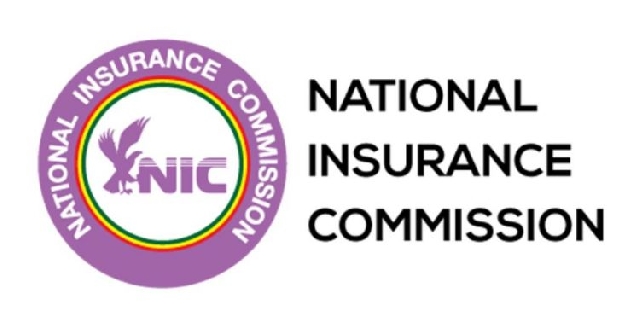DDE: NIC to freeze MCRs, CAR for 2 years, extend claims payment periods
 NIC
NIC
The National Insurance Commission (NIC) intends suspending for two years, the minimum capital requirement and capital adequacy ratio for insurance companies so as to moderate the impact of the domestic debt exchange programme.
The current minimum capital requirement of life and non-life insurance companies is ¢50 million.
The capital adequacy requirement is 14.2%.
A letter quoted by Accra-based Joy FM addressed to the insurance firms on draft regulatory forbearances to mitigate the impact of the Domestic Debt Exchange on insurance and reinsurance firms signed by the Commissioner of Insurance, Dr. Justice Ofori, said: “A set of guidelines will be developed and issued to guide the operation of regulated entities during the moratorium period”.
“These forbearances will be available to be regulated entities that abide by the operational guidelines that will be issued”, the letter noted.
Other measures include revising claim payment timelines, effecting a 40% reduction in NIC product approval fees, postponing the implementation of IFRS 17, and creating regulatory assets.
Additionally, insurance companies would be given up to four to five years to write-off the day-one losses on the new bonds.
This will require some departure from the accounting standards which require such losses to be written off on day one.
Also, a framework would be fashioned out to guide the re-pricing of insurance products in response to changes in pricing assumptions occasioned by the Domestic Debt Exchange programme.
Furthermore, the number of working days within which non-life claims are to be paid after the signing off of the discharge voucher will be increased from five to 15 days.
Maturity claims for life insurance would be paid in 15 rather than three days.
Again, for any product at all, the maximum period within which all processes leading to the payment of claims should be completed would be eight rather than four weeks.
The NIC also said it will release up to 50% of the minimum Statutory Deposit to eligible regulated entities to shore up liquidity upon request.
The amount released shall solely be for the payment of claims and shall be replaced within two years.
In December 2022, the Financial Stability Council released the following statement concerning the impact of the debt exchange programme and how it could be mitigated:
FINANCIAL STABILITY COUNCIL
GOVERNMENT OF GHANA DOMESTIC DEBT EXCHANGE: POTENTIAL FINANCIAL SECTOR IMPACTS AND MITIGATING SAFEGUARDS
A. Background
On 5th December 2022, the Government of Ghana launched Ghana’s Domestic Debt Exchange programme, an invitation for the voluntary exchange of approximately GHS137 billion of the domestic notes and bonds of the Republic, including E.S.L.A. and Daakye bonds, for a package of New Bonds to be issued by the Republic. The Exchange excludes Treasury Bills in totality, and notes and bonds held by individuals (natural persons).
B. Potential Impacts on Debt Exchange on Financial Sector
Stress tests have been conducted by the relevant financial sector regulators to estimate the potential impact of the Debt Exchange for banks, specialised deposit-taking institutions (SDIs), insurance firms, asset managers, collective investment schemes, pension fund trustees, and regulated pension schemes, that could result from their participation in the debt exchange.
C. Regulatory Tools to Mitigate Financial Stability Risks from the Debt Operation
To help manage the potential impacts of the Debt Exchange on the financial sector, financial sector regulators will deploy all regulatory and supervisory tools to mitigate risks to financial stability. Regulators will assess impacts on a regular basis, and quickly address evolving risks in order to safeguard financial stability. To support and encourage full participation of financial institutions in the voluntary debt exchange:
Regulatory Forbearance on Liquidity and Solvency
Financial sector regulators will temporarily reduce regulatory capital and liquidity requirements for regulated firms and schemes that voluntarily participate in the debt operation. Regulators will also suspend or delay any new rules that will have an adverse impact on liquidity or solvency. Each regulator will communicate more specific reliefs to its regulated firms/schemes in due course.
Ghana Financial Stability Fund (GFSF)
The GFSF is being established with a target size of GHC 15 billion to be provided by the Government of Ghana and its development partners.
The Fund will provide liquidity to financial institutions that participate fully in the Debt Exchange.
All financial institutions (banks, SDIs, pension schemes, collective investment schemes, fund managers, broker/dealers, insurance firms) that fully participate in the Debt Exchange can access the GFSF for augmented liquidity support, with effect from the date of completion of the Debt Exchange.
The Fund will be managed by the Bank of Ghana under unique operational guidelines being developed by the Financial Stability Council. The Financial Stability Council will provide ongoing advice and oversight for the use of the GFSF.
Accounting Treatment
Regulators are already in discussions with external auditors of financial institutions and will provide guidance to ensure a standardized approach to the accounting treatment applied to the Debt Exchange.
D. Conclusion
In keeping with its mandate, the Financial Stability Council will continue to closely monitor the impacts of the Debt Exchange on financial institutions and on the financial system as a whole, as well as the effectiveness of the measures outlined above.
These measures will be reviewed continuously and recalibrated as needed to ensure maximum effectiveness to safeguard the stability of our financial system and the protection of deposits, pensions, policy holders’ funds, and investor funds/assets.
Issued by the Financial Stability Council on 7th December 2022
Source: Classfmonline.com
Trending News

Transport operators threaten nationwide strike over indiscriminate trading on roads
14:09
Moses Baiden Jnr. honoured with Industry Innovation Excellence Award at 2025 Millennium Excellence Awards
01:44
More MMDCE nominees confirmed in Eastern Region amid strong support from Assemblies
08:59
Defence Ministry, Catholic Bishops’ Conference discuss collaboration on Sahel peace initiative
13:28
Ursula Owusu-Ekuful defends Akufo-Addo, slams NPP's ingratitude
01:36
E/R: Kwabeng miner vows to protect water bodies
08:49
Upper East Region records over 600 mental health cases in Q1 of 2025
12:52
Kwesi Baiden advocates for curriculum reform at Millennium Excellence Awards panel on AI and blockchain
00:49
Police assualt:Afenyo-Markin reports to police CID
10:37
Minority urges GRA to invite Nana Agraada over Sammy Gyamfi's dollar gift
14:45



